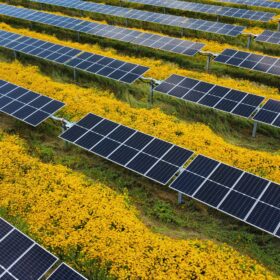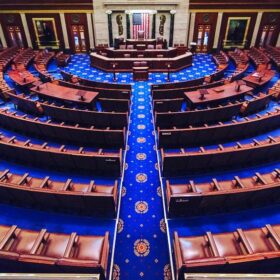We may be risking understatement in declaring that the 30% duties on imported PV cells and modules recently imposed by the Trump Administration are unpopular among the international solar industry. And by the deadline to file for an exemption late Friday, more than 20 manufacturers asked to be excluded from duties on their products.
SunPower, which was deeply involved in opposition to the Section 201 case, has been the loudest about its request for an exemption. However, the list of companies joining the high-efficiency maker in asking for product-specific exemptions reads like a who’s who of the solar industry, including big names such as Canadian Solar, Hanwha Q Cells, LG, Panasonic and REC Solar.
Additionally JinkoSolar has called for exemptions for its P-type mono PERC PV cells, which it says that it intends to use in the factory it is currently planning in Jackonsville, Florida. The company says that allowing an exemption for these cells would allow it to expand this facility.
SolarWorld?
Joining these is SolarWorld Industries GmbH, the company created following the insolvency of SolarWorld AG, using its European manufacturing. The tremendous irony here is that SolarWorld Americas, the U.S. subsidiary of SolarWorld AG, was one of two companies petitioning for these import duties.
To further add to this, EU ProSun President Milan Nitschke has asked for an exemption for the entire European PV industry, consisting of 30 companies but only 2 GW of annual capacity. As a former VP of SolarWorld, Nitschke says that while he supports trade action against China, Europe is the wrong target.
“Our main concern is that with a general import tariff without exclusion for fairly traded high-quality and sustainability European solar products Chinese companies absorbing the tariffs will only benefit more and eradicate competition in the U.S. market,” argues Nitschke. “This would not only harm customers but also backfire for U.S. manufacturing.”
Exemptions for special technologies
Two of the companies requesting exemptions are makers of power electronics. Enphase requested an exemption for AC modules that feature its microinverters, and SolarEdge has requested an exemption for “smart” modules with its embedded power optimizers.
SolarEdge noted that if the U.S. Trade Representative wouldn’t give it an exemption for the entire cost of modules using its technology, it would be satisfied with an exemption for the portion of value that the power optimizer represents.
Adding to this were a host of requests for exemptions of novel technologies, including calls by particular manufacturers to exempt their flexible solar panels, PV modules based on tiny cells, solar panels used in military applications and more. Many of these were not filed by companies that manufacture PV cells and modules themselves, and this included DSM’s request that metal wrap-through technology be excluded as well as 1366 Technologies’s request for an exemption for cells based on its Direct Wafer technology.
With the closure of the deadline to request an exemption, interested parties have until midnight on April 16 to file comments in response to these requests. At least one comment in favor of an exemption for SunPower has already been filed.
The timeline for a decision on exemptions is less clear, and there is no guarantee that the Trump Administration will issue exemptions for any of these products. But if there is one thing that is certain, it is that trade officials will have their work cut out for them given the variety of technological innovation within the global PV industry.
This content is protected by copyright and may not be reused. If you want to cooperate with us and would like to reuse some of our content, please contact: editors@pv-magazine.com.









By submitting this form you agree to pv magazine using your data for the purposes of publishing your comment.
Your personal data will only be disclosed or otherwise transmitted to third parties for the purposes of spam filtering or if this is necessary for technical maintenance of the website. Any other transfer to third parties will not take place unless this is justified on the basis of applicable data protection regulations or if pv magazine is legally obliged to do so.
You may revoke this consent at any time with effect for the future, in which case your personal data will be deleted immediately. Otherwise, your data will be deleted if pv magazine has processed your request or the purpose of data storage is fulfilled.
Further information on data privacy can be found in our Data Protection Policy.